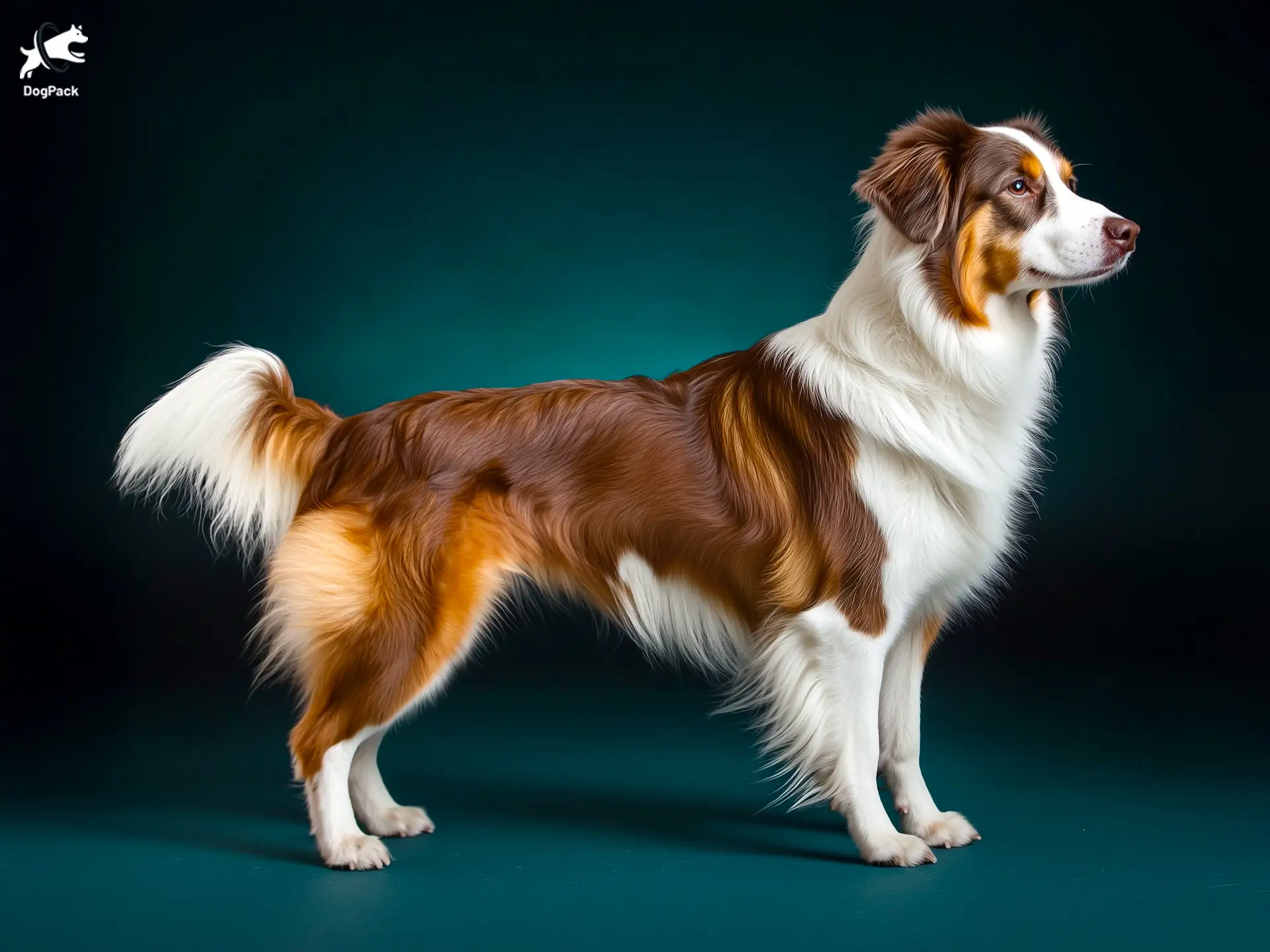Welsh Sheepdog Dog Breed Info & Overview
The Welsh Sheepdog is a hardworking and energetic herding breed, renowned for its intelligence and unwavering dedication. Bred in the rolling hills of Wales, this agile and quick-thinking canine thrives on activity and purpose. With a friendly demeanor and a keen instinct for herding, the Welsh Sheepdog is a perfect match for those seeking a devoted, high-energy companion.
Characteristics
Pictures
Breed History
Tracing its origins to the rugged hills of Wales, this breed was carefully developed by local farmers to manage livestock in challenging terrains. Historically, these dogs showcased remarkable agility, speed, and intelligence, making them invaluable on sprawling estates. Though its ancestry is intertwined with other rare dog breeds, the Welsh Sheepdog stands out for its resilience and adaptability across centuries.
My first encounter with one was on a misty Welsh farm, where the dog’s unwavering focus on her flock was downright inspiring. Locals recounted tales of these canines braving the harshest weather to gather wandering sheep. Over time, they were also prized for their innate protective instincts, watching over homesteads with unwavering loyalty and keen alertness.
Before official kennel clubs standardized many breeds, local families often bred these dogs for function above all else. As a result, some variations in coat color, ear shape, and even size can be found within the breed. Yet, their purpose has remained constant: excel at herding and guardianship. Today, ongoing efforts aim to preserve their heritage, ensuring this remarkable line endures.
Temperament, Personality
The Welsh Sheepdog is famed for its sharp intellect and tireless nature, traits that have long been appreciated by shepherds. Friendly yet vigilant, these canines are quick to warm up to family members but remain cautious around strangers. Their herding instincts run deep, so don’t be surprised if they subtly ‘round up’ visitors or other pets in the household.
They have a light-hearted side too, often displaying a playful streak that keeps their families entertained. At times, they can be a bit headstrong, especially if they sense a lack of direction or leadership. With consistent rules and positive reinforcement, however, they typically become devoted companions, always eager to please.
These dogs thrive on human interaction and may become bored if left alone for extended periods. Providing mental stimulation, like puzzle toys or interactive games, curbs unwanted behaviors and keeps them happy. Whether tagging along on a family hike or chasing a frisbee in the yard, they love being part of the action.
Physical Characteristics
Standing between 20 and 28 inches at the shoulder, these dogs boast a sturdy frame built for endurance. Their weight can range up to 75 pounds, but they retain an agile silhouette reminiscent of other herding breeds. A dense double coat protects them from damp weather, and it typically comes in combinations of black, white, red, or merle.
Ears can vary from semi-pricked to fully dropped, reflecting their diverse gene pool. Eye color is equally varied, sometimes featuring striking blue or mismatched eyes, hinting at centuries of selective breeding. Despite these differences, most individuals share a well-proportioned body and an alert expression that signals their readiness for work or play.
The Welsh Sheepdog’s athletic frame is complemented by nimble movement, allowing sudden bursts of speed to corral livestock. Their muscular hindquarters help them navigate hilly terrain, while strong front legs provide balance and power. This combination of form and function underscores their heritage as tireless workers, ever-ready to leap into action when duty calls.
Health Issues
Like many herding breeds, they can be prone to hip dysplasia and other joint-related concerns. Regular veterinary check-ups and maintaining a healthy weight can go a long way in preventing these issues. Another concern is progressive retinal atrophy, so routine eye exams are recommended, especially if you notice any changes in vision.
Occasionally, some lines might show sensitivity to certain drugs or treatments, a trait sometimes associated with collie-type dogs. It’s best to consult your vet before administering new medications. A balanced diet and moderate exercise are also key to keeping them in top shape, reducing stress on developing bones and muscles, particularly during puppyhood.
Owners of the Welsh Sheepdog should be attentive to routine screenings, including tests for hereditary conditions prevalent in working dogs. Early detection ensures a higher quality of life and might prevent costly treatments down the line. Keeping an open dialogue with a trusted veterinarian helps you stay proactive about their overall health and wellbeing.
Grooming Needs
This breed’s thick double coat can shed quite a bit, especially during seasonal changes. Weekly brushing with a slicker brush or comb not only helps manage shedding but also allows you to check for any skin issues or parasites. Keeping a regular brushing schedule is crucial to minimize matting, particularly behind the ears and around the neck.
Bathing every couple of months is usually enough, unless they’ve had a particularly muddy adventure. Over-bathing can strip the coat of its natural oils, leading to dryness or irritation. Trimming the hair around the paws helps maintain grip and cleanliness, especially for dogs who spend time outdoors in wet or rugged conditions.
For the Welsh Sheepdog, a routine nail trim is essential, as these active dogs often wear down their nails less on grassy fields than they would on pavement. Regular ear checks can prevent infections, especially in folded ears where moisture might accumulate. Staying on top of these tasks keeps them looking and feeling their best.
Exercise Requirements
These dogs live for action and can easily handle two hours of rigorous activity daily. From hiking in mountainous regions to sprinting after a ball, they excel in tasks that challenge both their bodies and minds. Skipping exercise sessions often results in pent-up energy, which can manifest as restlessness or even mischief around the house.
Structured activities like agility courses, canine sports, or even basic obedience drills help keep them mentally engaged. For high-drive dogs, advanced herding exercises can be a fantastic outlet, allowing them to practice the very skills they were bred for. If you have a spacious yard, daily fetch sessions provide excellent cardio without requiring a long car journey.
The Welsh Sheepdog thrives when allowed to burn off energy in interactive ways. Nose work, hide-and-seek, or puzzle feeders give them a mental workout while satisfying their natural curiosity. When incorporating exercise, balance is key—avoid pushing them too hard at a young age to safeguard joint health, but never underestimate their capacity for fun.
Training Tips
Known for their quick thinking, these canines respond best to firm but kind training methods. Harsh reprimands can backfire, undermining trust and slowing progress. Instead, consistency, patience, and high-value treats make excellent motivators. Short, focused sessions that keep them guessing often work better than long drills, as these energetic dogs can lose interest if not properly engaged.
Socialization from puppyhood is critical, especially since they can be protective and somewhat wary of outsiders. Introduce them to various environments, noises, and people at an early age to build confidence. By offering positive experiences, you pave the way for a well-adjusted adult who’s at ease in busy dog parks and family gatherings alike.
For the Welsh Sheepdog, mental stimulation is as vital as physical exertion. Teaching advanced commands or trick training can harness their problem-solving skills while strengthening your bond. This breed’s herding instincts also benefit from specialized tasks; channeling that innate drive into structured training ensures they stay engaged and less likely to develop destructive habits.
Nutrition, Diet
Given their high energy demands, most Welsh Sheepdogs do well on a diet that provides around 25–30% protein. Look for formulations specifically geared toward active or working breeds, often labeled “performance” or “high-energy.” For dogs weighing around 50 to 75 pounds, daily servings can range from 2.5 to 3.5 cups of quality kibble, split into two meals to maintain consistent energy levels.
Joint support is crucial for a breed that can be prone to hip and elbow issues. Supplements like glucosamine and chondroitin, or a diet enriched with omega-3 fatty acids, may help support healthy cartilage. Always consult your vet before introducing new supplements, but don’t overlook the role of regular exercise in managing joint health as well.
Calorie intake should be closely monitored, especially for individuals not engaged in regular herding or sporting activities. Obesity can stress joints and compromise overall well-being. Whenever possible, choose a quality brand with limited fillers to ensure maximum nutrient absorption. Fresh water is essential, so be sure to keep bowls filled, particularly after vigorous play sessions or training drills.
Adoption, Breeders
Finding a reputable source for this breed can be a bit tricky, given its rarity outside the UK. Some breeders prioritize working lines, so you’ll want to discuss your household needs before committing. It’s also wise to arrange a visit in person to see the puppies, their parents, and the conditions they’re raised in.
To explore adoption, check out local herding-dog rescues or organizations specializing in farm dogs. Occasionally, older dogs become available when working homes can’t keep them. Adoptapet.com and the Welsh Sheepdog Society are two excellent starting points for locating available dogs. Always ensure any rescue or shelter provides up-to-date health records and temperament assessments.
If you’re buying a Welsh Sheepdog, look for breeders who emphasize health testing, genetic screenings, and proper socialization. Ask for references or speak with previous puppy buyers to confirm a positive track record. A devoted breeder will share detailed insights into the breed’s needs, further helping you determine if this is truly the dog for your household.
Family Pet?
Despite their working heritage, these dogs can adapt surprisingly well to family life, given the right environment. Large, fenced-in yards offer them ample space to roam, which is crucial for channeling their herding drive. When they bond with children, they’re often gentle and watchful, but supervision is still advisable, particularly around younger kids.
One of their greatest strengths is their inherent loyalty. They naturally gravitate toward protecting the household, and this can manifest as barking or alert behavior when strangers visit. However, their affectionate streak means they also relish cuddle time on the couch—just be prepared for a large ball of fur snuggling up against you.
Socializing them early with other pets fosters harmonious relationships, especially if a cat or smaller dog is involved. High-energy play sessions can actually benefit the entire family, as these pups encourage everyone to stay active. Ultimately, whether your household is bustling with children or relatively quiet, they bring an uplifting, devoted presence to the mix.
Right For You?
Ask yourself if you can commit to a dog that thrives on daily exercise and mental stimulation. If your lifestyle leans toward outdoor adventures or you have a spacious backyard, this breed could be a dream companion. On the other hand, if you live in a small apartment and prefer quiet evenings, they may feel restless.
Training dedication is another factor: while extremely intelligent, these dogs demand consistent guidance. Owners who aren’t prepared to dedicate time to structured activities might find them a handful. Remember too that their protective streak can be both an asset and a challenge, so early socialization is a must to channel that instinct appropriately.
For anyone seeking an active, loyal friend with a knack for herding, the Welsh Sheepdog might be just the partner. However, be prepared for a whirlwind of energy—and the time commitment that comes with it. If you relish an engaging training process and appreciate a devoted companion, this breed can prove truly rewarding.
Conclusion
In summary, this breed’s history, energy, and deep-rooted loyalty make it a standout choice for those who value an active lifestyle and strong companionship. Their herding background means they thrive on tasks and revel in being part of a bustling household. If you’re drawn to a confident dog that requires both physical and mental engagement, consider giving a Welsh Sheepdog a place in your home. Just be ready to provide ample exercise, loving guidance, and a consistent routine. With the right balance of attention and activity, these hardworking canines quickly become cherished members of the family, ready to follow you into any adventure—whether it’s rounding up sheep or rounding up the kids for a game of catch.
FAQs
-
How is the Welsh Sheepdog different from the Border Collie?
The Welsh Sheepdog is more independent and free-thinking than the highly trainable Border Collie. It has a looser herding style, meaning it doesn’t rely as much on eye contact with livestock. Welsh Sheepdogs are also typically larger, more robust, and less standardized in appearance than Border Collies.
-
Do Welsh Sheepdogs work better in pairs or alone?
Welsh Sheepdogs are highly adaptable and can work alone or in pairs. They tend to cooperate well with other herding dogs, particularly in large pastures or rugged terrains where teamwork is essential. However, a single well-trained Welsh Sheepdog is capable of managing livestock efficiently on its own.
-
Can Welsh Sheepdogs be used for purposes other than herding?
Yes! Though primarily a working farm dog, the Welsh Sheepdog excels in dog sports, agility, obedience, and even search and rescue. Their intelligence and problem-solving skills make them suitable for roles that require quick thinking and stamina.
-
Why do some Welsh Sheepdogs have pricked ears while others have floppy ears?
Unlike many standardized breeds, Welsh Sheepdogs do not have a fixed ear type. Some have fully erect ears, while others have semi-pricked or floppy ears, depending on lineage. Their ears are highly expressive, helping them communicate effectively with both livestock and humans.
-
Are Welsh Sheepdogs suitable for city living?
Not ideal. The Welsh Sheepdog has high energy levels and thrives in rural or farm settings where it can run freely and engage in mentally stimulating tasks. Without adequate exercise and a job to do, they may develop destructive behaviors due to boredom.
Breed Ratings
Highly intelligent, the Welsh Sheepdog quickly learns commands and excels in problem-solving tasks.
Generally upbeat and playful, they enjoy interactive games and thrive on active family engagement.
Bursting with stamina, they need frequent physical and mental challenges to stay happy and balanced.
Seasonal coat blowing can be heavy, but regular grooming keeps most of the fur situation under control.
Their instincts lean toward herding rather than chasing, but they may still pursue smaller animals if untrained.
Routine brushing is essential due to their double coat, especially during peak shedding seasons.
Responsive to consistent, positive methods, yet can be headstrong without clear leadership and varied routines.
Prolonged solitude can lead to boredom and destructive behavior, as these dogs crave social interaction.
They’re quick to alert, especially with strangers or unusual noises, though proper training can moderate this.
Generally minimal droolers, they won’t leave puddles but may drool slightly after vigorous exercise or drinking.
Usually sociable with other canines, especially if socialized early, but might attempt herding behaviors during play.
Overall robust, but be mindful of joint issues and eyesight concerns; regular vet care keeps them going strong.













